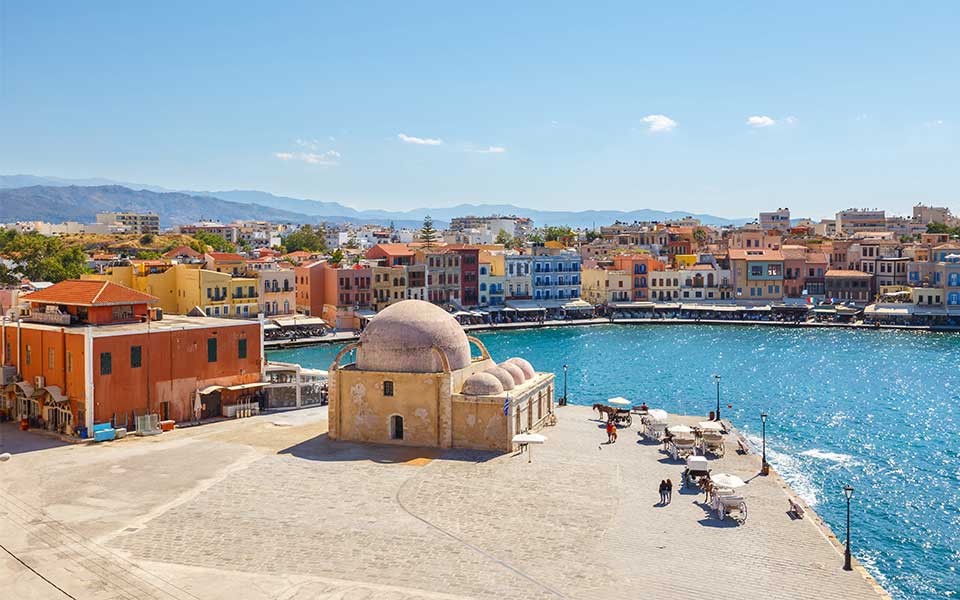Picture the scene: you’re sitting on a sundrenched balcony overlooking the sapphire blue waters of the Aegean, cradling a mug of freshly brewed coffee, and periodically glancing at the laptop on the table in front of you. You’ve got a Zoom meeting with your business colleagues in London at 11, and you need to file that accounting report by 3; after that, the day is yours. What do you do next? Head to the nearby beach for a swim? Or meet up with some of your newly made Greek friends at the local taverna?
The agony of choice …

© Shutterstock
The rise of the digital nomad
Let’s face it, the silver lining to the grim ordeal that was the Covid-19 pandemic was the rise of remote working. As countries across the globe locked down, companies required their staff to work from home, prompting a massive spike in the use of videoconferencing software like Zoom, Microsoft Teams, Slack, and WhatsApp.
At the height of the pandemic in 2020, hundreds of millions of workers worldwide shifted to remote working for the first time, slashing financial costs for organizations (office space and related expenses), reducing traffic congestion and air pollution in heavily populated urban areas, and boosting overall employee satisfaction and wellbeing. I mean, who doesn’t like going to work in their pajamas?!
At the start, it felt like win-win situation for just about everyone (although spare a thought for the parents who spent months grappling with online schooling). But besides the obvious benefits, it quickly dawned on people that remote working could open-up a whole new raft of opportunities away from the 9-to-5 grind. It even prompted some to make that long-awaited dream move to foreign climes, as “digital nomads.”

© Shutterstock
Navigating the high seas of Greek bureaucracy
It’s no secret that Greece is an incredible place to live. Wrapped in the warm embrace of the eastern Mediterranean Sea, this country is a stunning mix of islands, rugged mountains, historic sites, and cultural traditions that stretch back millennia. With its year-round good weather, relatively affordable accommodation (when compared to North America and most of the rest of western Europe), deliciously healthy cuisine, super friendly locals, and laidback vibe, it’s small wonder that Greece is at the top of the list of the world’s most desirable places to live.
For aspiring expats out there, wondering how to navigate the challenges of moving to Greece for work, there is good news. The Greek government is specifically targeting retirees and remote workers from abroad, offering favorable tax and property investment incentives to relocate here and invest in the local economy.
While on the surface, Greek bureaucracy may seem a little stifling, government officials in recent years have strived hard to streamline the process for prospective expats who want to move to the country and give the economy a much-needed boost.

© Shutterstock

© Shutterstock
If you’re an EU/EAA citizen
If you’re an EU citizen, or a citizen of Iceland, Norway, Liechtenstein, or Switzerland (EAA countries), you can move to Greece and work remotely without the need for any kind of entry visa. If, however, you plan on staying longer-term, for more than 12 months, you should consider applying for a Tax Identification Number (AFM) at the local tax office, which will enable you to open a Greek bank account. Other than that, the only thing you’ll need is your laptop.
If you’re not
For the non-EU/EAA citizens out there, the process is a bit more involved, requiring a Type D entry visa and the newly launched Digital Nomad Visa. But don’t worry, if you’re eligible, the paperwork is relatively straightforward.
For third party nationals wanting to stay in Greece longer than 90 days, a Type D entry visa is required. This must be applied for at the Greek consulate or embassy in your country of origin and may take several months to process. The application requires a certain amount of documentation, including copies of your biometric passport, two passport-size photos, proof of accommodation in Greece, proof of sufficient financial means, a medical certificate (including a chest x-ray and a test for tuberculosis), proof of medical insurance that is valid in Greece, and proof of a clear criminal record.
More information on the Type D Visa can be found here.
In addition to the entry visa, all prospective workers from outside the EU/EAA must apply for a Greek Digital Nomad Visa, which gives you legal residence in the country for up to a year, after which you can apply for a Digital Nomad Residence Permit, valid for up to two years and is renewable.
Launched in 2021, this scheme was specifically designed to attract overseas workers who are financially secure and working for companies abroad or self-employed. If you’re already in Greece on a Type D Visa, you can submit your application to the Greek Ministry of Migration and Asylum. The system is relatively quick, and you should hear back from them within 10 days. If you’re outside of Greece, you will need to apply via the Greek embassy or consulate in your country of residence.
There are four specific documents required for the Greek Digital Nomad Visa. These are:
- A declaration letter attached to your application form, stating your intention to work for a company outside of Greece, and details of your income, which must be no less than 3,500 euros per month after tax deductions. If you want to bring immediate family to the country, you’ll have to account for additional finances – an extra 20 percent for a spouse/partner and 15 percent for any dependent child.
- Proof of employment from abroad. The scheme does not allow for any kind of part-time or freelance work for a Greek company, so you will have submit a valid employment contract confirming that your job is headquartered outside Greece. If you are self-employed, you’ll have to submit relevant details concerning your company (license/registration number), its corporate purpose, and so on.
- Proof of sufficient financial means. In order to satisfy the minimum requirement of 3,500 euros net income per month, you will need to submit copies of your most recent bank statements, company accounts (if self-employed), and confirmation of your salary.
- Proof of payment. The cost of the Greece Digital Nomad Visa currently stands at around 75 euros, which is non-refundable.
As soon as you receive confirmation of your remote work visa, you’re ready to go.

© Shutterstock
The tricky issue of double taxation
As straightforward as all of this sounds, there is the tricky issue of taxes. Under Greek law, tax is based on residential status, but to be considered as a tax resident, you need to spend more than 183 days in the country in one calendar year. As a digital nomad, depending on how long you decide to stay in Greece, you may be subject to taxation on your income. However, the good news is that the Digital Nomad Visa gives you an immediate 50 percent reduction on income tax, regardless of whether you’re here for one or two years.
As far as your country of residence is concerned, there may be specific rules in place concerning “double taxation.” US citizens, for example, must continue to pay federal, state, and local taxes, even when they’re away, but may be able to get credit or an income tax reduction on the foreign tax paid during their time abroad. The best thing to do is consult an accountant or discuss the issue with the relevant authorities at your country’s Greek embassy or consulate before applying.

© Shutterstock
Co-working spaces
Greece, especially Athens, is now home to a fast-growing network of co-working spaces, enabling digital nomads from around the world to come together, develop collaborations, and engage in the creative process of running online businesses. For many, remote working can be isolating experience. Co-working spaces counteract that, giving people the chance to bounce ideas off each other, seek out investment opportunities, and develop a sense of community; a home away from home.
Read about Athens’ thriving co-working spaces, including The Cube and Impact Hub, here.
Similarly, on Crete, co-working spaces are springing up all over the island, as local authorities are keen to attract more and more digital nomads from abroad. For more information, please see: www.workfromcrete.gr
A word to the wise
Low internet speed in Greece has often been cited a major drawback for digital nomads in the country, especially in the more remote regions of the mainland and some of the smaller islands. Nevertheless, there have been significant advances in the past few years, largely because of the pandemic and the need for local workers to operate from home or in a hybrid setting. Fiberoptic technology is fast becoming standard in many city neighborhoods, with 5G network coverage in Athens at 97 percent. In 2023, more than 60 percent of the country has 5G coverage.
Compared to most of the rest of Europe, Greece still has a solid reputation for being good value for money. However, as the cost of living crisis shows no sign of going away any time soon, some areas of the country, especially Athens, Thessaloniki, and the popular tourist islands of Mykonos and Santorini, are becoming prohibitively expensive. The cost of accommodation in these places usually skyrockets during the summer tourist season, so be mindful of where you want to base yourself.
Finally, as a remote worker, it’s important to consider the impact of being away from home for a prolonged period, away from friends and family, and away from regular face-to-face interaction with work colleagues. Remote work has been known to hinder the formation of friendships, so it’s vital that you make every effort to connect with the local people around you, forge new relationships, and engage with the community.












